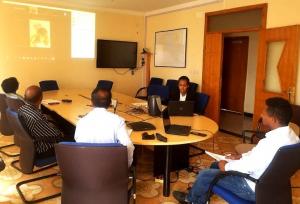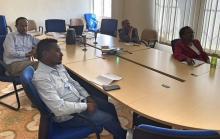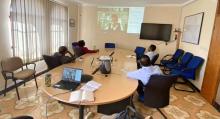The Ninth WHO Global Forum for Government Chief Nursing and Midwifery Officers
The Ninth WHO Global Forum for Government Chief Nursing and Midwifery Officers (GCNMOs) and the Eighth Triad Meeting organized jointly by WHO, the International Confederation of Midwives and the International Council of Nurses was held through a virtual meeting from the 16th to 19th June 2020.
The focus of the meeting was on COVID-19; evidence-informed policy dialogue to advance nursing and midwifery; and the global strategic directions for nursing and midwifery
The meeting was attended by over 240 participants; 4 delegates from the Ministry of Health representing Eritrea, Government nursing and midwifery leaders from across the globe, national nursing associations, national midwifery associations, along with stakeholders from nursing and midwifery education, regulation, NursingNow.
The meeting was opened with remarks from the WHO Director General, Dr Tedros Adhanom. He emphasized 2020 as the year of Nurses and Midwifery, highlighted the need in prioritizing on education and leadership, as Nurses and Midwives account for the majority of the health professionals (59%) [World’s Nursing Report, 2020]
Day one focused on nursing and midwifery workforces as essential to COVID-19 preparedness and response. The session was complimented by country experiences in different healthcare settings, the challenges and approached used. For instance, Italy reiterated the crucial role health workforce play in combating COVID-19. Some of the challenges faced included shortage of nurses (50,000); physical and emotional wellbeing of the workforce, an issue that was echoed by many countries.
Day two was centered around the role of nursing and midwifery leadership in facilitating evidence-informed policy dialogue. New data and evidence on nursing was provided through the State of World’s Nursing report (SoWN) 2020. The session highlighted how SoWN country data can be leveraged for policy dialogue. Few countries provided their experience, including India, Botswana, Saudi Arabia and the UK. India and Botswana shared how they have used data for policy dialogue to stimulate jobs for nursing and midwives, promote education, regulation, and practice, including the establishment of residence centers, which the Eritrean team were keen to explore.
Day three covered Global Strategic Directions for Nursing and Midwifery. Discussion was held with the participants on what the priorities of focus are for countries. It was anonymous that the top 3 priorities focused on: Education and training matching the health system objectives; Leadership roles; and Data. This was supported by the Eritrean team, who agreed the key role education and data play on strategic implementation.
Day four underscored the importance of Nursing at the planning level; understanding our respective health systems and community needs. The various governance events (WHA 73rd; RC 2020; UN General Assembly etc.) were shown as opportunities to carry this agenda forward and advocate at a higher level. It was highlighted that signs of success would be the actual change brought on the ground because of the policy changes.
In summary, as a result of the proceedings and deliberations of the meeting, the participants committed, as relevant to their respective roles, to supporting their country in the development and implementation of the 10 key actions. Some of these include strengthening the position and contributions of nursing and midwifery within health systems; expanding the capacity of nursing and midwifery education and training institutions; and leverage the data and evidence in the SoWN report for policy dialogue.


